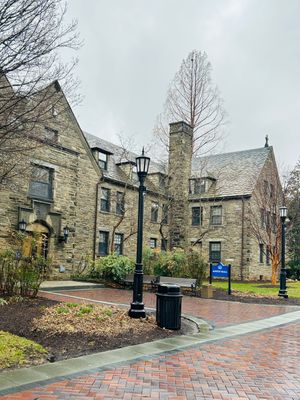The Area: Nestled in the heart of the posh Main Line suburbs, Villanova is about 12 miles (30 minutes by train or car) from downtown Philadelphia, offering a safe, traditional campus with easy access to one of the nation’s largest and most historic cities. The region is known for its tree-lined streets, stately architecture, and sense of community, while Philly’s museums, music venues, restaurants, and professional sports are just a few miles away. It’s a 20-minute ride to the Philadelphia International Airport, and proximity to NYC (less than 2 hours) and D.C. (about 2.5 hours) make the location even more appealing in terms of access to major cities.
The City: While Villanova is quiet and residential, the close connection to Philadelphia offers students plenty of off-campus opportunities for culture, internships, and fun. The regional rail system SEPTA has two stops directly on campus, giving students easy access to Center City and beyond. With Philadelphia’s reputation as a hub for healthcare, business, law, and nonprofit work, students find it easy to connect what they learn in class to the real world. The city also adds to the school’s strong spirit, especially during March Madness—Villanova men’s basketball is a Philadelphia institution.
The Campus: Villanova’s 260-acre beautiful and well-maintained campus is an elegant mix of Gothic architecture and modern facilities centered around community and tradition. There are three main sections of campus (Main, South, and West), with a pedestrian bridge connecting students to different areas. Housing is guaranteed for the first three years and includes a mix of traditional housing and apartment-style options (mainly for upperclassmen). Floors or wings are generally gender-specific, though the university also offers gender-inclusive options through its “Unitas Housing Assignment” program (part of the school’s commitment to ensuring all students feel welcome on campus). Senior housing is limited and based on a lottery.
Construction is underway (completion anticipated in 2027) for the new Falvey Library, which will be part of a larger building filled with research and teaching commons, meeting and event space, and much-needed additional study spaces for the campus. Villanova also recently assumed ownership of Cabrini College, which is two miles away, and will seek to increase class sizes and create a new campus extension by the 2026-27 school year (larger enrollment!).
The Students: The school’s Augustinian Catholic identity informs its values—students here often cite a deep sense of purpose, service, and ethical responsibility. Students who were incredibly engaged and involved in high school are those most likely to succeed and thrive at equally engaged ‘Nova. The approximately 7,000 undergraduates are academically motivated and service-minded.
Tradition, as much as academic and professional preparation, is a big draw. Villanova draws many students from the East Coast, particularly the Mid-Atlantic region, and the student population does lean “white, preppy, and rich” overall. About 35% of students come from out of state.
There’s a strong campus culture at Villanova—service trips, club activities, and campus ministry are popular, and basketball games at Finneran Pavilion are can’t-miss events. To make sure that other sporting events are also well-supported by campus fans, students can earn “points” by attending other events to help increase their chances in the basketball ticket lottery. As an Augustinian college, service is a large part of campus culture, and the school hosts the largest student-run Special Olympics each year, and ongoing projects with Habitat for Humanity are well-attended.
School pride is highly visible, and Villanova students (and alumni) proudly wear the blue and white, especially during NCAA tournament season. On weekends, students might head into Philly for food or fun, but there’s no shortage of campus activities, from acapella concerts to cultural events to outdoor movie nights. Greek life is a presence, with approximately 30% of students participating, though the school operates delayed rush and does not have Greek housing on campus.
Academics: The university emphasizes critical thinking, leadership, ethics, and service, and small class sizes (averaging 22 students) foster close relationships between students and faculty. Opportunities for research, internships, and study abroad are plentiful, and 95% of graduates are employed or in graduate school within six months. Students can also take part in the Villanova Career Compass program, which guides career development from first year to graduation.
Villanova offers a rigorous liberal arts education (classes are generally challenging and writing intensive across the board) grounded in Augustinian values, with four main undergraduate colleges: Liberal Arts and Sciences, Engineering, Business (VSB), and Nursing. Students must pick a college (and a major, in some cases) at the time of application.
Notable Programs:
- The School of Business is consistently ranked among the nation’s best for undergraduate education and boasts strong ties to top employers, especially in finance, consulting, and accounting.
- Villanova offers a direct-entry BS in Nursing and is growing the number of available seats from 100 to 125. Highly ranked and very competitive, students must start in the program their first year (no transfers).
- Communication and computer science students can apply for semester-long internships at the Vatican in Rome.
- The highly-regarded College of Engineering began classes in the new Drosdick Hall, a state-of-the-art facility with a 2-story Innovation Lab, interdisciplinary research labs, and common spaces open to all.
- Villanova is starting a new elementary education program with the acquisition of the Cabrini campus.
Cost: For the 2024–25 academic year, the total cost of attendance (including tuition, fees, housing, and meals) is approximately $85,000. Villanova is committed to meeting 100% of demonstrated financial need for all admitted students, and roughly half receive some form of financial aid. Competitive merit scholarships are available but very limited.
Villanova offers a values-driven university experience, strong school spirit and traditions, top-notch academics with a pre-professional edge, and a beautiful campus with big-city access.
Visit Villanova University’s website to learn more and see if it’s a good fit for you.

